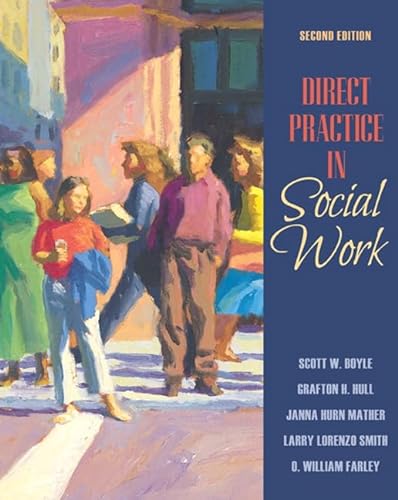This highly accessible direct practice text offers a practical introduction to the theories and skills necessary to engage in effective, strengths-based practice.
Developed specifically to address the issues facing students as they prepare for direct practice in today’s world, Direct Practice for Social Work interweaves diversity and social justice throughout the chapters and teaches students how to make the connections between major theories and real-world situations.
Written in an engaging style by experienced authors, this text encourages the development of students’ critical thinking skills while demonstrating the practical applications of theory.
Highlights include chapters opening case studies, numerous case studies in each chapter, and more modeled responses, sample dialogues and exercises than are found anywhere else.
Comprehensive coverage of the major theories and adherence to CSWE guidelines make this text an invaluable addition to any professional social work educational or professional library.
Direct Practice in Social Work, 2/e
By: Scott W. Boyle, Larry L. Smith, O. William Farley,
Grafton H. Hull, and Jannah Hurn Mather (All of the University of Utah)
Basic Approach:
This highly readable direct practice text offers a practical introduction to the theories and skills necessary to engage in effective, strengths-based practice. Direct Practice in Social Work weaves diversity and social justice throughout, while demonstrating to students how to make the connection between major theories and real-world situations.
Written in an engaging style by experienced authors, this text encourages the development of students’ critical-thinking skills. Highlights include chapter opening case studies, numerous case studies within each chapter, and an abundance of modeled responses, sample dialogues and exercises.
Comprehensive coverage of the major theories and adherence to CSWE guidelines make this text an invaluable addition to any social work student or practitioner’s library.
Highlights of the New Edition:
- New coverage of ethical issues regarding the use of technology, greatly increased discussion of boundaries and dual relationships, content on guardianship for clients with diminished capacity (Ch.3)
- New coverage of gambling addictions and their assessment, as well as a new section on assessing depression in older adults (Ch.5)
- New content on developing service contracts and inclusion of solution-focused therapy in planning (Ch.6)
- New information on dialectic behavior therapy and motivational interviewing and how they can enhance coping skills. (Ch 8)
- New content on practice guidelines for GLBTQ clients (Ch.10)
- Delineation between treatment and task groups and increased coverage of norms and behaviors in groups (Ch.11)
- More attention to GLBTQ issues and the elderly, greatly strengthened discussion on advocacy in direct practice (Ch. 12)
- More attention to ethical issues in evaluation, discussion of advantages and disadvantages of quality assurance
- New discussion of the unique needs of older adults around the process of termination (Ch.14)
- NEW Supplement for Students! MyHelpingKit is an electronic supplement that offers book-specific learning objectives, chapter summaries, flashcards and practice tests as well as video clips and interactive activities to aid student learning and comprehension. The password can be value-packaged with each new copy of this text at no additional cost to students. Professors should contact their local representative for ordering information: www.pearson.com/replocator
What Your Colleagues Are Saying:
“Students love [this text] because it covers so much and they feel they have some framework on which to build their clinical skills.” ― Mary Hart, University of Wyoming
“The authors comprehensively cover the NASW Code of Ethics. The specific information included is quite appropriate in order for social work practitioners to gain a solid understanding of practice expectations related to values and ethics.” ― Vanessa Hunn, University of Kentucky, Lexington
“I think the ‘Voices from the Field’ sections do a particularly good job of showing the diversity not only of social workers themselves, but also the variety of types of jobs that they perform.” ― Julie Emmer, University of Central Florida
[MyHelpingKit Ad]
